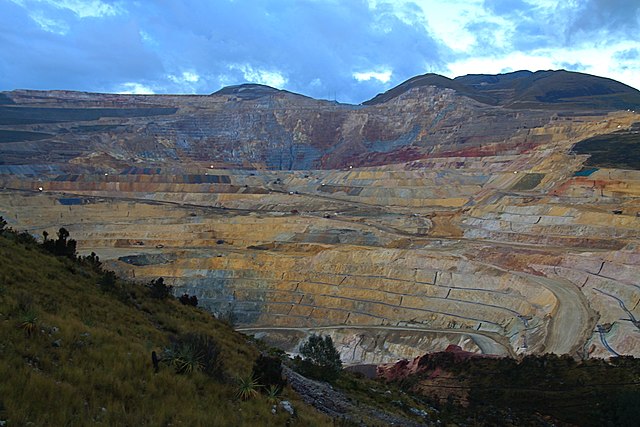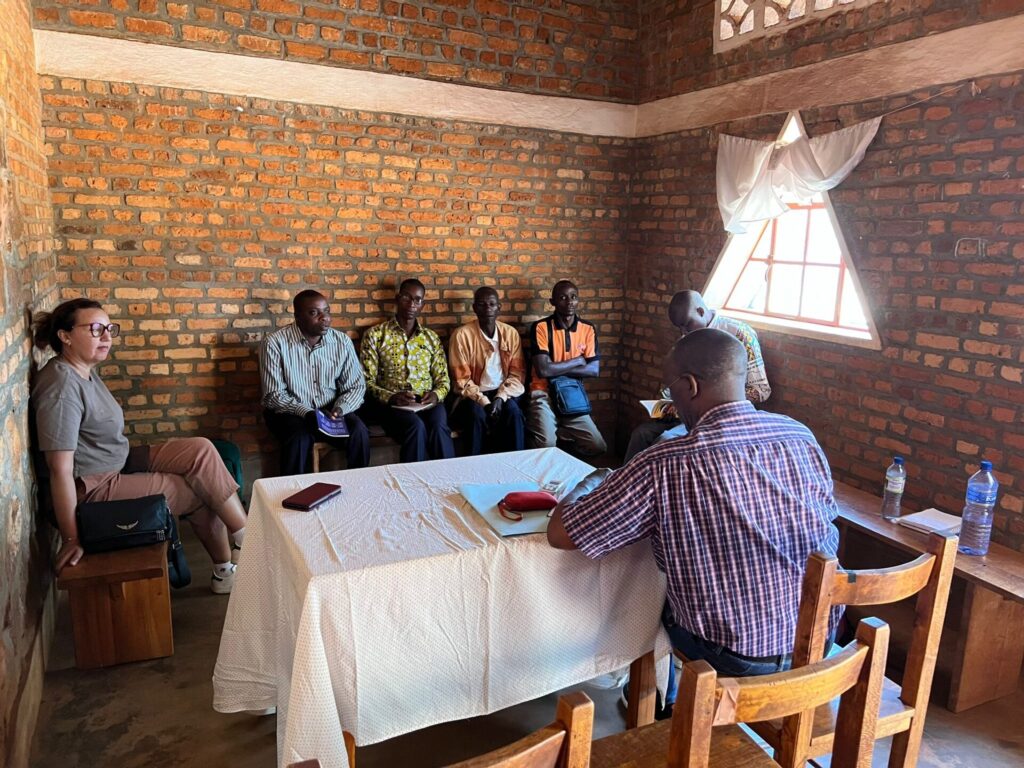L’extractivisme : c’est quoi ?
Extractivism has come under serious criticism, particularly from authors from South America, because of its political, economic, social, environmental and other consequences. Eduardo Gudynas[1], chercheur uruguayen spécialiste de cette question, définit l’extractivisme comme l’appropriation de ressources naturelles, de quelque nature que ce soit (ressources minières, énergies fossiles, viande, produits de la mer, produits agricoles, bois, etc.), en grands volumes, afin de les exporter comme matières premières. Cette définition n’implique en rien que ces ressources soient extraites par des multinationales étrangères. C’est ce que Gudynas, notamment, met en évidence dans son étude du cas bolivien[2], in which he indicates that extractivism can take place in various property regimes, but also illegally or informally. Likewise, this definition extends to all natural resources: mining resources, fossil fuels, meat, wood, agricultural products, fish and other seafood products, etc.

Credits: Golda Fuentes 2013, Wikimedia.
The Bolivian case under the presidency of Evo Morales is an example, among others, of a new form of extractivism, based on progressive rhetoric according to which the State must control this extractivism in order to remove part of the surpluses generated; and use this share for redistributive and poverty reduction policies. The notion of neo-extractivism aims to account for this new form of extractivism, implying a more important role for the State and cooperatives, real or facade, and this new legitimation, linked to social questions. We also speak of progressive extractivism or new extractivism. The defense of this form of extractivism is generally accompanied by an opposition between social concern and environmental concern, as if the latter would have the effect of preventing development and perpetuating poverty.[3].
Concentration of wealth
For Alicia Barcena, from the executive secretariat of CEPAL (Economic Commission for Latin America), extractivism is in a dead end because it concentrates wealth in few hands[4].
Eduardo Gudynas, among many others, highlights how extractivism is based on the transfer of costs to communities. As mentioned below, this is happening in a context in which a whole bunch of costs, monetizable or not, are simply not taken into account and where companies are largely exempt from taking protective measures, an exemption which results in savings for them, but significant costs for many others.
Addiction
For Frédéric Thomas[5], the reduction in poverty and inequality, which Latin America experienced at the beginning of the century, has ceased since 2015. It was linked to an extractivist orientation combined with high world prices for raw materials. Faced with the fall in these prices, on which a large part of tax revenues and social programs depend, the solution often seems to be reduced to extracting and exporting even more to compensate for the losses. This dynamic aggravates conflicts linked to extractivism, strengthens the country in the role of supplier of raw materials and importer of manufactured goods and prevents the diversification of its economy.
Same story with Gudynas[6], for whom extractivism prevents industrialization and imposes subordination to international trade, all of whose rules must be accepted in order to continue to export raw materials. Rodolfo Garcia Zamora[7], for his part, notes that extraction is taking up more and more space in Latin American economies. The examples of Bolivia under Evo Morales and Ecuador under Rafael Correa show that extractivism has not served to diversify the economy.
Violence
For Gudynas[8], we should not be surprised by the resurgence of violence around the mining issue. It is no longer just about the opposition between foreign communities and companies, but also about conflicts between miners of various categories, between them and peasants or indigenous peoples. Violence is an integral part of extractivism.
Frédéric Thomas, for his part, points out that extractivism requires massive investments, creates very few jobs, and is focused on the global market. It involves very powerful actors and has significant impacts that are difficult to control. It excludes other activities. For these reasons, it is inherently a source of conflict.
This extraction of natural resources, closely linked to violence (exterminations, slavery, etc.), is at the center of the incorporation of Latin America into the world economy, from the conquest of the region from the turn of the 16e century, as notably recalled by Franck Gaudichaud[9].
Environment
It is well known and widely documented that extractivism has dramatic negative consequences on the environment. It is based on a predatory and reductive relationship to nature. For Gudynas[10], extractivism is only possible if we reduce nature to a simple set of resources recognized on the basis of their use for material human purposes. A tree is not a tree but a pile of wood. Nature and the beings that compose it have no value other than their market value. Its cultural or spiritual dimension is denied.
Standards
Extractivism is accompanied by a weakening of social, environmental, health, consultation of populations, labor standards, etc. As well as their control by public authorities. This weakening of standards, which aims to encourage extractivism, to make it possible and to attract investment, tends to extend to all areas of public life.
This phenomenon is described in particular by Gudynas but also by Maristella Svampa[11] for whom Recent years confirm the relationship between the development of extractivism and the decline of democracy: weakening of environmental controls, strengthening of criminalization, increase in assassinations of environmental activists in the context of conflicts for access to land and to natural goods
Capitalism
For Maristella Svampa, neo-extractivism, just like extractivism, is at the center of contemporary accumulation, capitalism implying an increasingly greater consumption of raw materials and energy and therefore an increasing pressure on goods. natural resources and territories.
In the context of this globalized economy, according to her, neo-extractivism allows us to grasp geopolitical changes with the relative decline of the United States and the rise of China as a global power. This hegemonic transition is correlated with the intensification of raw material exports and the consolidation of increasingly unequal economic and socio-ecological ties with China. This process of global reconfiguration is accompanied by a dizzying return of economies towards the primary sector.
For Horacio Machado Araóz[12], there is no capitalism without extractivism. For him, being a supplier of raw materials follows a model of international division of labor inherited from the colonial era; Extractivism is a structural feature of capitalism. The latter involves sacrificed zones which provide the “ecological subsidies” of unequal consumption.
For him, at the center of extractivism, we find the figure of the conquistador as the prototype of humans and their relationship to the world (to conquer): armed, violent men, eager to get rich quickly, seeing the world as a pure object of possession and conquest and life as a race for wealth and power. But this imperial way of life imposes itself on us, persuades us, seduces us, including the colonized populations, which dehumanizes us, naturalizes violence and pillage. There is no capitalism without extractivism. Capitalism involves the reaffirmation of a colonial structure of the world economy. It is wrong to view extractivism as a transition to something else. To think this way is to think in the very terms of capitalism and not take nature into account.
What to do ?
Specifically, it is possible to improve respect for rights and the environment within the framework of extractivism through a duty of care. This concept, widely debated in European bodies, aims to require companies to identify, prevent and repair the negative consequences of their activity on rights and the environment, as well as across the entire value chain. To be effective, such a duty of care must concern all companies and all sectors. It must include effective consultation of potentially affected populations, on the basis of honest, impartial, complete, accessible and understandable information. It must also include effective access to justice, taking sufficiently into account that disputes on this type of issue often pit parties who are very unequal in terms of influence, information and means.
More generally, it is extractivism itself and its imbrication in an unequal and unsustainable global economy that is problematic. Meeting this challenge involves basing the economy on the principles of human rights, democracy and equality, as well as on another relationship with nature and the non-human.
Mikaël Franssens.
[1] GUDYNAS, Eduardo, “Los extractivismos sudamericanos hoy. Permanencias and changes between the social situation and the pandemic” in Cuestionamientos al modelo extractivista neoliberal desde el Sur. Capitalism, territories and resistance. Cristian Alister, Ximena Cuadra, Dasten Julián-Vejar, Blaise Pantel & Camila Ponce, eds. Ariadna Ediciones, Santiago de Chile, 2021, Extractivisms hoy: social outbreak and pandemic
[2] GUDYNAS, Eduardo, “Guerras extractivistas en Bolivia”, CETRI, August 30, 2016, Guerras extractivistas en Bolivia – Tricontinental Center (cetri.be), accessed January 30, 2023
[3] GUDYNAS, Eduardo, (2021), op. cit.
[4] Quoted by GUDYNAS, Eduardo, “Latin America: the exhaustion of “development”, the confessions of CEPAL”, CETRI, March 10, 2020, Latin America. The exhaustion of “development”, the confessions of (…) – Tricontinental Center (cetri.be), accessed January 25, 2023-01-25
[5] THOMAS, Frédéric, “Socialism is not compatible with extractivism”, CETRI, September 23, 2021, Socialism is not compatible with extractivism – Tricontinental Center (cetri.be), accessed January 30, 2023
[6] GUDYNAS, Eduardo, (2020), op. cit.
[7] Rodolfo García Zamora (Dir.), Megamineria, extractivism and economic development in Latin America in the XXI century, Maporrua – Universidad Autonoma de Zacatecas, Zacatecas, 2015.
[8] GUDYNAS, Eduardo, (2016), op. cit.
[9] GAUDICHAUD, Franck, “Mining resources, “extractivism” and development in Latin America: critical perspectives”, Ideas [Online], 8 | 2016, posted online on December 16, 2016, consulted on January 30, 2023.
URL: http://journals.openedition.org/ideas/1684; DOI: https://doi.org/10.4000/ideas.1684
[10] GUDYNAS, Eduardo, (2021), op. cit.
[11] SVAMPA, Maristella, Las Fronteras del neoextractivismo en America Latina. Socio-ambient conflicts, eco-territorial climate and new dependencies, Bielefeld University Press, 2019 (PDF).
[12] Horacio Machado Aráoz: No hay capitalism without extractivism – OPLAS.org





